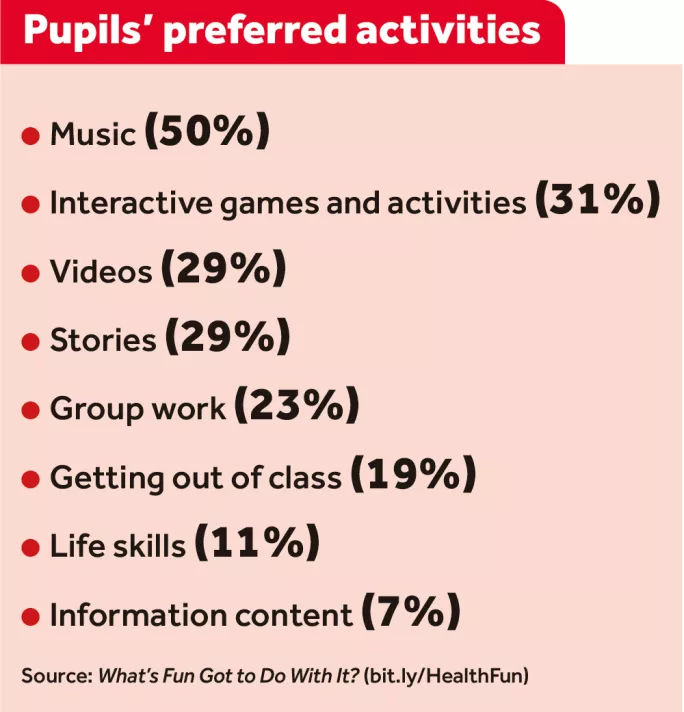
Fun’s the word for engaging learners

Traditionalists may baulk at the idea - but research has found that big personalities and fun activities are crucial in getting important messages across to teenage pupils.
The research looked at health and wellbeing lessons in particular, but the conclusions are believed to apply to other parts of the curriculum, too.
The findings suggest that health education programmes are liable to fail if they focus solely on content, and that pupils’ wellbeing could be boosted if more thought is put into how the messages are communicated.
The way programmes are delivered - especially the use of “youth-friendly aspects” such as music, video, activities, stories, getting out of class and a sympathetic facilitator - are critical to secure pupils’ buy-in, the study shows.
The research, What’s Fun Got to Do With It?: engaging young people in a school-based wellbeing programme, also suggests that the choice of person to work with pupils is critical, and that they must have qualities of “empathy, genuineness and respect”.
An “unexpected finding” was the “importance attached to the approach and personality of the facilitator involved in programme delivery”.
Pupils noticeably often referred to that person by name in survey responses and recalled qualities such as “fun, kindness, humour and understanding”.
Similarly, school staff said that “an understanding of how teenagers think” was essential in visiting speakers, as well as “genuineness”, “commitment”, “gentleness” and “a capacity for self-reflection”.
Yet there are “scant” references in research literature to the importance of personality in school mental health or wellbeing programmes, despite the new research showing this is “strongly linked” to success, according to the study.
It also places “very strong emphasis” on the finding that, for young people to open up to mental health and wellbeing programmes, they must be “engaging”, “fun” and “meet students where they are at”.
‘Kids hate dry delivery’
The research analyses the reaction to a mental health programme of 182 pupils of various ages in four secondary schools in Ireland, with teachers and senior staff also canvassed. Researchers Dr Tom Farrelly, a social science lecturer at the Institute of Technology in Tralee, and Seamus Whitty, project manager of the Kerry Life Skills programme, said that their findings backed previous research showing that education programmes often lose sight of the importance of student “buy-in”.
“These process elements, rather than solely programme content, may be central to programme effectiveness itself, as they may directly influence student buy-in,” they wrote in Education Health.
The report adds that “it is well established that young people learn best when they are having fun, at ease, feel safe...and consider the material being explored to be relevant”.
It recommends further research into the elements most valued by pupils, including music, games, videos and stories.
Secondary teacher Robert Macmillan - who was a founder of a youth project in Castlemilk, Glasgow before entering the profession - said that the report “chimes with what I have long believed”.
He added: “My worry in secondary schools is that few teachers actively volunteer to teach PSE (personal and social education) and that all too often it can be dumped on teachers with gaps in the timetable [that] can also involve...a lot of PowerPoints and worksheets.”
Another secondary teacher in Scotland, Sarah Tennant, said: “Pupils need to feel empowered and that they are making their own decisions on their health and wellbeing - if it is content-driven and too teacher-led, the engagement level will decrease.”
One Scottish secondary teacher, who asked not to be named, agreed about the importance of personality in conveying tricky health and wellbeing messages.
“All kids know which teacher will be as dry as dust, and then they can be quite embarrassed,” he said.
“I have one very conscientious colleague who prepares for hours on these issues, but kids hate the dry delivery. Others can turn up with no planning and shoot from the hip.”

You need a Tes subscription to read this article
Subscribe now to read this article and get other subscriber-only content:
- Unlimited access to all Tes magazine content
- Exclusive subscriber-only stories
- Award-winning email newsletters
- Unlimited access to all Tes magazine content
- Exclusive subscriber-only stories
- Award-winning email newsletters
You need a subscription to read this article
Subscribe now to read this article and get other subscriber-only content, including:
- Unlimited access to all Tes magazine content
- Exclusive subscriber-only stories
- Award-winning email newsletters
- Unlimited access to all Tes magazine content
- Exclusive subscriber-only stories
- Award-winning email newsletters